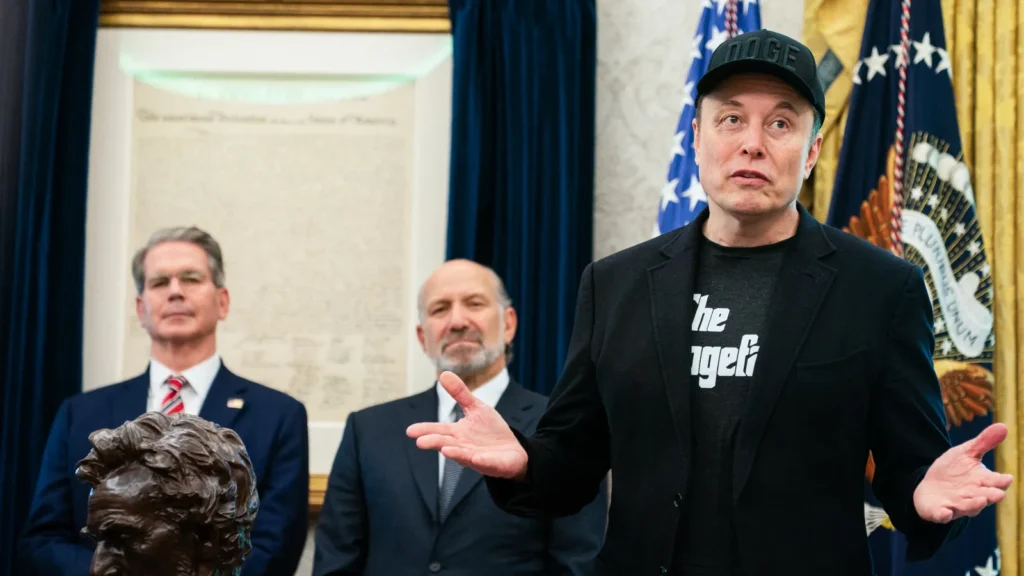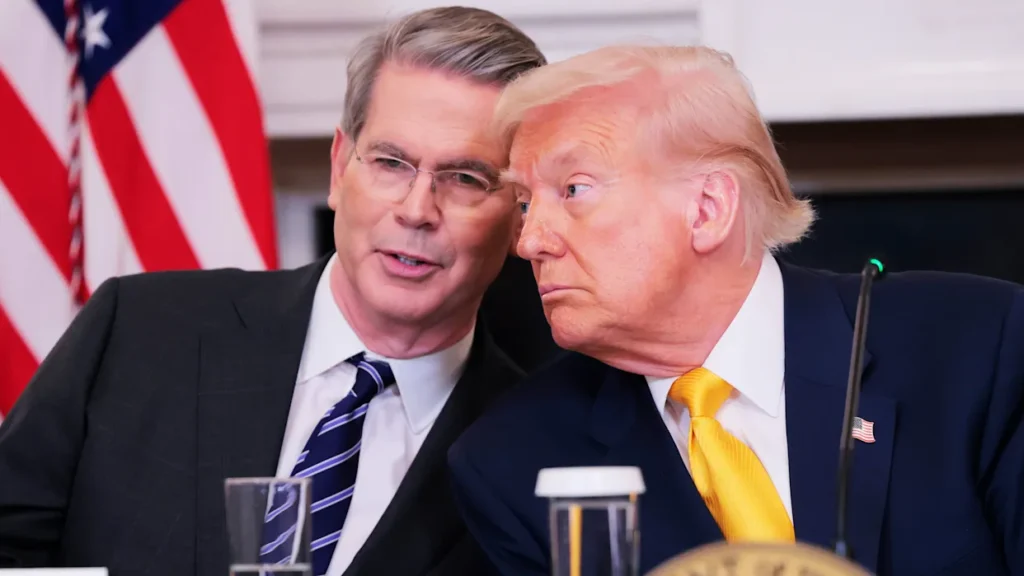Elon Musk’s announcement of a new political party has sparked a nationwide debate. But what caught major headlines recently was Scott Bessent’s reaction to Elon Musk’s political party. Bessent, a former top economic advisor to Donald Trump and ex-Treasury official, did not hold back in criticizing Musk’s political move.
In a sharply worded statement, Bessent labeled the initiative as a “dangerous distraction” that could hurt the conservative movement more than help it. His comments reflect growing tensions between traditional Republicans and emerging tech-driven political voices.
In this article, we explore what Bessent said, why he said it, the implications of Musk’s political venture, and what it means for the future of American politics.
Who Is Scott Bessent and Why Does His Opinion Matter?
Scott Bessent is no ordinary commentator. He served as the Chief Investment Officer at Soros Fund Management and later worked closely with Trump’s economic team. Known for his sharp economic insight and strong political views, Bessent’s opinions carry weight in Republican circles.
He’s not just a financial expert—he’s a key player in shaping conservative economic policy. So, when Scott Bessent speaks on Elon Musk’s political party, people listen.
Elon Musk’s Political Party: What Do We Know So Far?

Earlier this year, Elon Musk shocked the political world by announcing plans to launch a new political party, reportedly called “The Centrist Party”. Musk claims the goal is to unite moderate Republicans and Democrats, targeting what he describes as the “politically homeless.”
Key features of Musk’s party include:
- Tech-forward policy innovation
- Support for free speech and digital rights
- A strong anti-establishment tone
- Focus on border control and AI regulation
Musk has publicly said he is tired of the “tribalism” in U.S. politics and believes there’s room for a third major force.
Scott Bessent’s Reaction: A Blunt Rebuke
When asked about Musk’s political ambitions in a recent interview, Scott Bessent didn’t mince words:
“This isn’t innovation. It’s fragmentation. At a time when the conservative movement needs unity, Musk wants to play politics like it’s a startup.”
Bessent argued that Musk’s political experiment could splinter conservative votes and hand victories to Democrats by default.
He added:
“If he’s serious about defeating the left, he wouldn’t be trying to divide the right. This is Silicon Valley ego, not strategy.”
Why Is Bessent So Concerned?
Bessent’s criticism stems from strategic concerns:
- Vote Splitting: Musk’s party could pull voters away from Republican candidates, especially among young and libertarian-leaning demographics.
- Lack of Political Experience: Musk has never held political office. Bessent sees this as a dangerous lack of practical knowledge.
- Mixed Messaging: While Musk claims to champion free speech, Bessent and others feel his positions are inconsistent, particularly on social issues.
There’s also a personal angle. Bessent is closely tied to the traditional Republican donor class. A new power player like Musk entering the scene could disrupt that network.
What Do Other Conservatives Think?
Bessent isn’t alone. Several Republican lawmakers have expressed similar worries—although less bluntly. Some fear that Musk’s political party might become a spoiler in the 2026 midterms or even the 2028 presidential race.
Yet, others are cautiously optimistic. They believe Musk’s involvement could bring fresh energy and new voters into conservative politics.
A few prominent conservative influencers, especially in tech and finance, have openly supported Musk’s move. This includes figures like Peter Thiel, who praised Musk’s courage in challenging the two-party system.
Musk Responds to Critics Like Bessent
Elon Musk responded to criticism—including Bessent’s—via X (formerly Twitter). In a series of posts, Musk said:
“Old-guard Republicans are scared because they’ve lost touch with reality. We need a party for people, not donors.”
He later added:
“I respect Scott Bessent’s work in finance, but politics isn’t Wall Street. It’s time for a system upgrade.”
These comments suggest that Musk isn’t backing down. Instead, he’s positioning himself as a disruptor, much like Donald Trump did during his first campaign.
The Bigger Picture: What Does This Mean for 2026 and 2028?
The 2026 midterms are already shaping up to be unusually competitive, and Musk’s new political party could influence dozens of races. If he fields candidates, even in a few key states, it could sway the outcome.
Looking ahead to the 2028 presidential election, the possibilities are even more dramatic. Some speculate Musk could run himself—though he’s not eligible due to being born in South Africa. However, he could play the role of kingmaker, funding a candidate aligned with his vision.

Scott Bessent on Elon Musk’s political party reflects a growing division in conservative strategy:
- Should conservatives modernize and partner with tech elites?
- Or should they stick with traditional power structures and party loyalty?
This battle could define the Republican Party for the next decade.
Public Opinion: Who Supports Musk’s Party?
Polls show mixed reactions:
- About 32% of voters say they’re open to a third-party option if it’s led by someone like Musk.
- Among young Republicans (ages 18–29), that number rises to 45%.
- Older conservatives, however, largely agree with Scott Bessent’s concerns, with only 15% supporting Musk’s idea.
This generational divide is critical. It suggests Musk’s party could gain early momentum but might lack staying power unless it appeals to a broader base.
Media Coverage and Conservative Media’s Role
Right-wing media outlets are split. Platforms like The Daily Wire and Newsmax have questioned Musk’s intentions. Others like Tim Pool’s podcast and Joe Rogan’s show have shown more support, praising the idea of “disrupting the machine.”
Bessent has appeared on several conservative programs to share his concerns, urging voters and donors to stay the course with the Republican Party.
Financial Implications: Will Donors Flee to Musk?
Musk’s wealth means he could easily fund the first phase of his political party without external help. But long-term success requires infrastructure and grassroots support. That’s where Scott Bessent’s warning hits home—many seasoned donors are not interested in starting over.
One anonymous GOP donor said:
“I admire Musk’s innovation, but politics is war, not software development. We need leaders who understand that.”
Still, smaller donors and digital-first fundraisers are leaning Musk’s way. This could mirror how Barack Obama and later Bernie Sanders harnessed online donations to power their campaigns.
Final Thoughts: Is There Room for Musk and Bessent in the Same Tent?
Probably not—at least not for now. Scott Bessent on Elon Musk’s political party is more than a critique. It’s a signal that the Republican establishment sees Musk not as an ally, but as a threat.
But American politics is famously unpredictable. A year from now, alliances may shift, and what seems like a fight today could turn into a partnership tomorrow.
For now, however, the lines are drawn. Musk’s party is rising. And Bessent, along with many GOP veterans, is watching with caution—and concern.
Conclusion
The clash between Scott Bessent and Elon Musk over the new political party is a snapshot of a much larger battle within the American right. It pits innovation against tradition, personality against policy, and startup thinking against deep-rooted strategy.
Whether Musk’s party will succeed remains to be seen. But one thing is certain—he’s stirred the pot, and the ripple effects will shape U.S. politics for years to come.
Read Next – Medicaid Cuts in Trump’s Megabill Spark Backlash from Kentucky Governor






